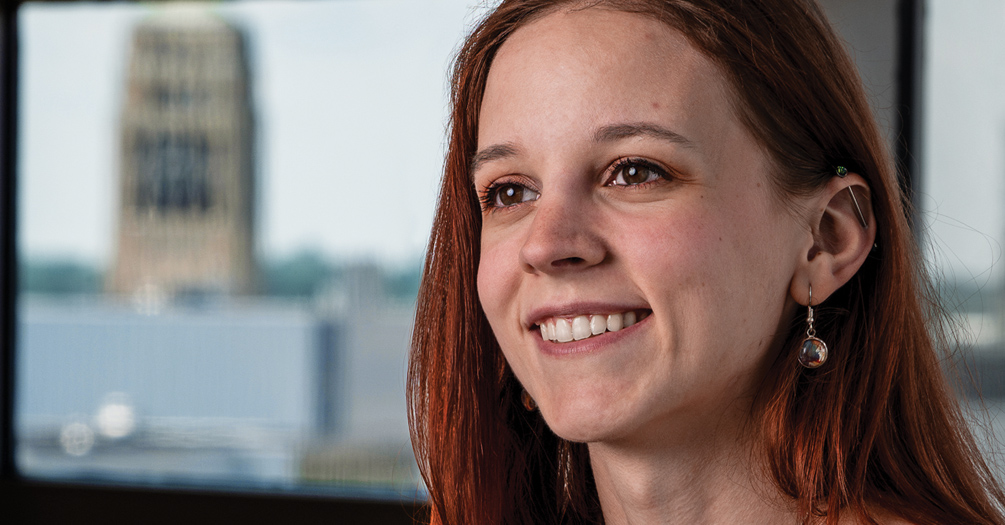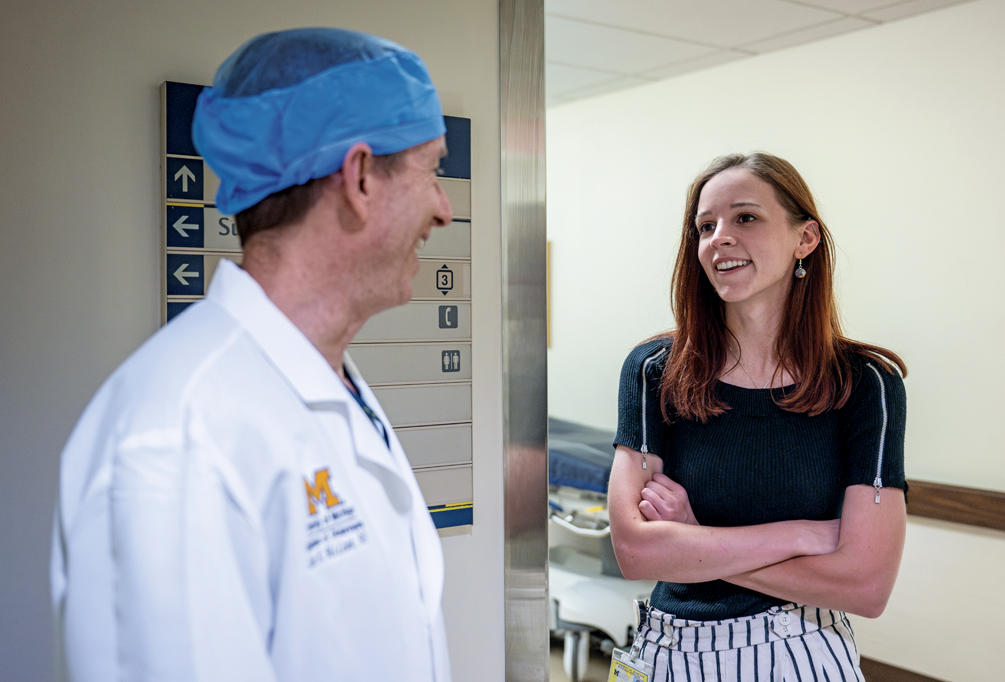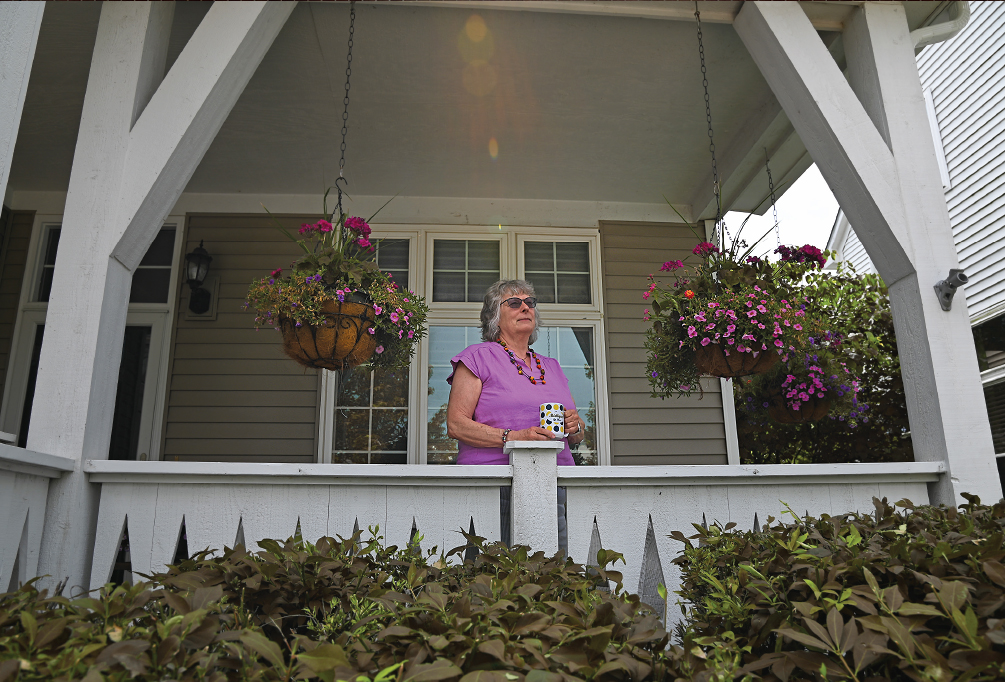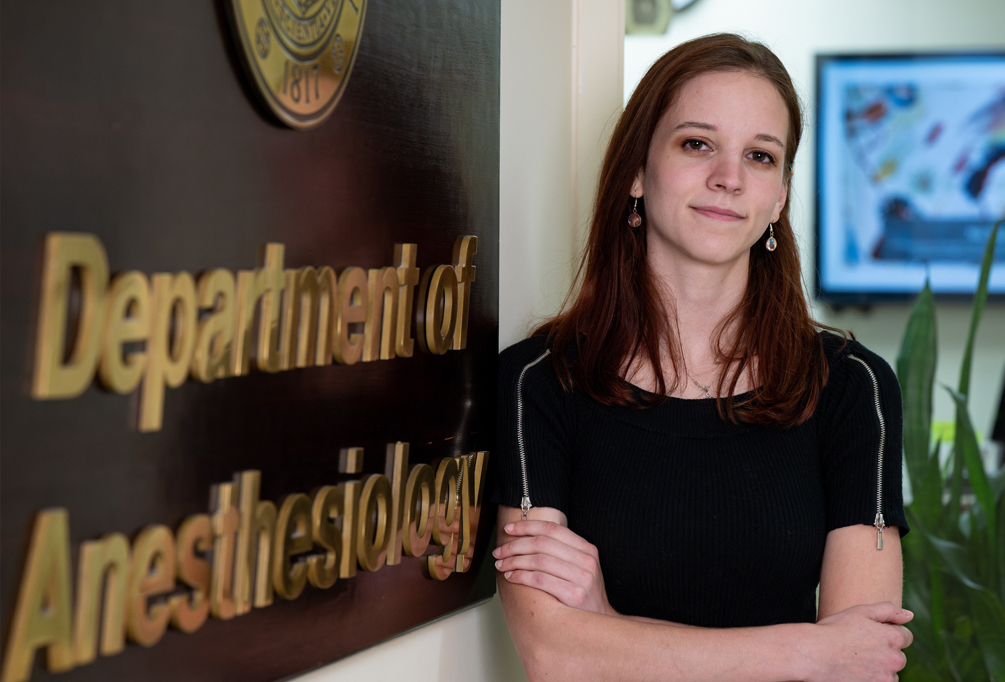Conducting skills

From music education to public health research
By Julie Carle
London Kozlowski dreamed of being an orchestra conductor.
Music played an integral part of her life after she studied violin when she was 6 years old and later added saxophone and French horn. However, the Flushing, Michigan, native ultimately found surgical instruments more than musical instruments provided a path toward her desired goal of a career helping others.
Today, Kozlowski, a second-year Master of Public Health student in Environmental Health Sciences at the University of Michigan School of Public Health, is involved in a different kind of conducting.
Instead of conducting music, she is conducting research as part of her master’s program and through her work as a surgical technologist in Michigan Medicine’s main operating rooms.
With the vast and far-reaching research opportunities that are available through the University of Michigan and its teaching hospital, Kozlowski is involved in research that includes studying benign tumors called paragangliomas, helping establish standards of care under the Green Anesthesia Initiative, and analyzing data for a spine oncology surgeon’s project.
I love the environmental health sciences aspect of the program, especially from a standpoint of helping people who need it.”
— London Kozlowski, on pursuing her Master of Public Health at Michigan Public Health
The world of health and medicine captured her heart as she worked in the fast-paced, high-pressure environment of the operating room.
Surgical technology suits her hard-working, driven personality. As she teamed up with medical experts—surgeons, anesthesiologists and nurses—she absorbed knowledge like a sponge and wanted more.
She enrolled in the MPH program at Michigan Public Health in Fall 2023 to deepen her understanding of the environment and public health and prepare her for medical school.
The Flint water crisis in 2014 was the environmental issue that captured her attention. She became personally involved when her high school orchestra organized concerts and fundraisers to amplify the need for clean water for Flint residents.
“After that, I knew I wanted to help people, and the Master of Public Health program seemed like the perfect fit,” Kozlowski said. “I love the environmental health sciences aspect of the program, especially from a standpoint of helping people who need it.”
The faculty and staff at Michigan Public Health and the medical teams in the operating rooms have supported Kozlowski and encouraged her to ask questions and take advantage of experiential learning opportunities.
“The surgeons and staff have been my biggest support system, and they believe in me,” she said. “I’ve also gotten close with some of my instructors.”
Kate Manz, assistant professor of Environmental Health Sciences, “taught me so much from day one through the last day of the lab analysis and samples class.”
Also, with the help of Lynda Lisabeth, senior associate dean for Faculty Affairs at Michigan Public Health, professor of Epidemiology and research professor of Neurology, Kozlowski has developed a research project of her own that looks into noise exposure and stroke prevalence.
Prompted by her grandmother’s stroke experience and Kozlowski’s interest in sound from her music background, she believes there’s a connection between noise and strokes.
“Noise exposure can increase hypertension, which then increases stroke prevalence,” she said.
Lisabeth’s expertise in stroke epidemiology and health disparities “guided me through the process of how to do the research from start to finish,” Kozlowski said.
Using noise exposure maps from the University of Washington, she analyzed various factors and found there was an increase in stroke prevalence due to heavy noise exposure.
“My goal was to figure out just one small part of it, and maybe I will be able to help make a difference in future stroke activity,” she said.
PROSPECTIVE STUDENT? Learn more about Michigan Public Health.

A different kind of conducting
As Kozlowski works on her master’s program with an eye toward medical school, conducting research has become an important tool for her growth.
In addition to the stroke research, she worked with a Michigan Medicine anesthesiologist on the Green Anesthesia Initiative for her summer MPH research requirement. The study is based on greenhouse gas emissions and inhaled anesthesia for patients, with the goal of lowering the amount of inhaled anesthesia because it’s safer for patients and it lowers the amount of greenhouse gas emissions into the environment, she said.
Fascinated with the initiative from a patient perspective and the implications for the environment, Kozlowski asked if she could be involved and help analyze data. In addition to creating an online dashboard to show the impact of reduced anesthesia, the research team hopes to establish a standard of care for the initiative.
“This internship gives me a different aspect of healthcare and what goes on behind the scenes,” she said. “In my job, I mostly see the surgery and not the clinical work that anesthesiologists do, which I never really thought about before.”
Noise exposure can increase hypertension, which then increases stroke prevalence.”
— London Kozlowski
The reduction of anesthesia keeps the patient-first perspective, but also ensures care for the environment as well, Kozlowski said.
In February 2023, Kozlowski presented research about benign tumors known as paragangliomas at the North American Skull Base Society medical conference. The presentation, based on research led by Drs. Gregory Basura and Joshua D. Smith of Michigan Medicine, focused on accurate assessment of the benign tumors on the vagus nerve, carotid artery and jugular vein in the neck.

Because paraganglioma growth is slow, the research recommended not performing surgery as the standard of care.
“The only time we would actually do surgery was if the tumors were affecting the quality of life for the patient; otherwise, there is such a huge risk to the vagus nerve, carotid and jugular,” Kozlowski said.
Currently, a team of approximately 30 people is studying the genetics of paragangliomas to see if there is any correlation between genes and the tumors.
Kozlowski has recently started working with Dr. Nicholas Szerlip, a spine oncology surgeon, and Dr. Oludotun Ogunsola, a resident physician. In the early stages, she and others on the team are looking at patient data to see what kind of tumors have been identified.
All the research is broadening her knowledge base for her master’s degree and preparing her for medical school.

Staff member’s scholarship makes a difference
Kozlowski knew balancing school and her job would be a challenge, but she was determined to make it work. She didn’t want to burden her parents with the cost of another degree.
“I knew school would be expensive, but I was worried I wouldn’t have enough money to complete the program,” she said.
Then Kozlowski learned she was awarded a significant scholarship, a fund created by Michigan Public Health retiree Susan Crawford.
For 42 years, Crawford was an integral staff member in the Department of Environmental Health Sciences, starting as a secretary for the program and retiring as the graduate program coordinator.
She enjoyed the camaraderie with the students, faculty and staff from the time she joined the staff as a recent college graduate throughout more than four decades. When she started the secretarial job, the faculty handled all the student services work, Crawford said. Eventually, a position was created for her to oversee the student services responsibilities.
I have strong feelings for the Environmental Health Sciences department and the students, and I wanted to do something for them.”
— Susan Crawford
Supporting students is a foundational value at the University of Michigan and something she took seriously throughout her career. She became the department’s go-to person to answer questions or help with student-related activities.
SUPPORT research and engaged learning at Michigan Public Health.
She was always ready with a listening ear, a suggestion for next steps and plenty of encouragement. It was a role she cherished.
“It was such a great job. You never went into the office expecting to do the same thing,” she said.
In 2008, Crawford’s 30th work anniversary, “the stars aligned perfectly to create a scholarship,” she said. She inherited money from her aunt at the same time the university was offering a match-gift opportunity.
She had seen the difference that scholarships made for students by reducing their financial burden or allowing them to focus more on their studies and less on a job.
“I have strong feelings for the Environmental Health Sciences department and the students, and I wanted to do something for them,” she said.
As one of the first staff members at the university to establish a scholarship, Crawford noticed at the time that many of the scholarships were created after faculty and staff retire.
“Why not do it now and see the results?” she said.
The award has increased significantly since she started the fund in 2008, through the growth of the endowment plus additional gifts from faculty and alumni.
“I have to thank all the donors for actually making this scholarship work, because there was a good chance it wouldn’t get endowed,” she said. “But all my students have stepped up and have donated to it year after year. It confirmed I did the right thing for the right reason.”
Kozlowski is thankful for Crawford’s decision to fund the scholarship so many years ago. The Susan Crawford Scholarship allows Kozlowski to balance school and work.
“The scholarship has helped with actually paying for school and not having to worry if I’m going to have enough money to complete the program,” she said. “It has allowed me to cut back on my hours at work, just enough to keep my benefits at the hospital.
“The scholarship has helped me tremendously. It has only made me more determined to do well so I can keep progressing, whether I end up in anesthesiology, surgery or emergency medicine.”
Now as the conductor of her schedule, Kozlowski said the scholarship lets her continue to learn on the job, at school and through the multiple research projects she has added.

